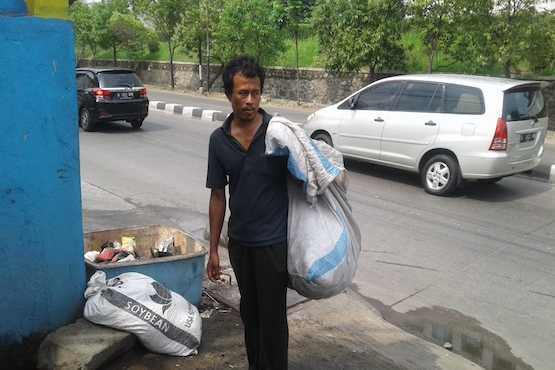
Sarmin collects garbage, including plastic bottles, in Jakarta to sell to buy food. (ucanews.com photo)
Sarmin is one of the scavengers who every day wanders Jakarta, without sandals or shoes, collecting disposed of goods and reselling it to buy food.
Every day he brings an iron stick to sort out and pick up used materials. He then stores them in a plastic bag to sell to collectors. Although he only makes US$2 per day, he never gives up because he has no other option.
"I can't even eat rice every day, let alone fish," he said, because the money he earns is for his entire family, including his two children.
For Sarmin, 47, being a scavenger means he has to live with dirt and an odorous smell that follows him wherever he goes. Many people avoid getting too close to him.
He acknowledges that he always finds food, including rice, thrown in the bins.
A scavenger since he was 10 years old, Sarmin admits that he collects used goods such as plastic bottles, newspapers and cardboard because they are light and easily sold.
"I am not ashamed of this job even though for many people it's dirty work," he said.
Similarly, Nanang, 56, another scavenger, who walks around Jakarta collecting used iron and copper, said decent food is what he and his children want most.
"I go out early in the morning and will only eat in the afternoon after earning money from selling what I have collected," said Nanang, who comes from Depok, West Java.
The father of three said he enjoys pulling his cart around the city but that eating only once a day isn't sufficient. It is however the best option to keep his entire family alive.
"It's not bad. I get US$3 daily which is good to buy rice, coffee, sugar and cigarettes," he said, adding that sometimes he sleeps in his cart when he is exhausted.
He was surprised when he heard that Indonesia had the second highest rate of food waste in the world according to the Food and Agriculture Organization (FAO).
Excessive food waste
The scavengers' stories are in sharp contrast to the many Indonesians who waste millions of tons of food each year.
Recently Mark Smulders, head of FAO Indonesia and Timor Leste, said that every year Indonesians throw out 13 million metric tons of food.
The biggest contributors to food waste were hotels, restaurants, supermarkets and mini-markets, Smulders said.
Capuchin Bishop Martinus Dogma Situmorang of Padang, West Sumatra province, blames poor management and extravagant lifestyles for food waste.
"Meanwhile the poor must struggle to get food," Bishop Situmorang told ucanews.com.
The Economic Intelligence Unit (EIU) noted Indonesia's food waste occurred despite 7.6 percent of the country's 260 million people suffering from malnutrition.
The EUI said more than 36 percent of Indonesia's children aged under five suffer from stunting — reduced growth due to prolonged malnutrition — and about 14 percent of children suffer from an acute loss of muscle mass.
"It's a painful reality that while a large number of poor and malnourished people are in need of food, some people waste it," Bishop Situmorang said, adding, "Other people's right to food has been deprived."
Caritas Indonesia has called on religious leaders to educate people to foster a simpler lifestyle "sensitive to poor people."
Pope Francis has condemned the West for throwing out food while many people and families in the world still face hunger and malnutrition.
According to Bishop Situmorang, Indonesia's economic system doesn't support the poor but "strips off our sense of humanity."
The Central Statistic Agency reported that as of March 2017 the number of poor people in Indonesia had reached 27.7 million people.
Bishop Situmorang called on the government to promote equality, "so that all people feel the benefit of development."
The Community of Sant'Egidio, a Catholic lay group in Jakarta, provides food for the poor every week. "This is our concern for them who every day struggle to get food," Eveline Winarko, coordinator of the community in Indonesia said.


